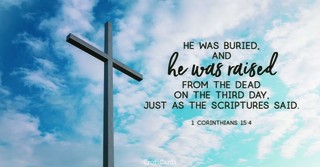- Recent Translations
- All Translations
1 Corinthians 15:43
Share
Settings
1 Corinthians 15:43 Meaning and Commentary
It is sown in dishonour
Its original is dishonourable, it comes, as the Jews often say F23, (hhwro hpjm) , "from a filthy drop"; its generated brought forth in a manner we are ashamed of; it is conceived in sin, and shapen in iniquity; it is unclean, and born of the flesh: and when born, is in such a condition, as is to the loathing of it; some of its members are less honourable; and so uncomely as always to need a covering; it is subject to various blemishes, defects, and imperfections, and few bodies are without one or another; and liable to many injuries and affronts, as the body of our Lord himself was, who gave his back to the smiters, his cheek to them that plucked off the hair, and hid not his face from shame and spitting; and in death, it is nauseous, filthy, and very dishonourable, so that the nearest relation and friend cannot take pleasure in it, but desires to bury it out of sight; and amidst the greatest funereal pomp and splendour, it is laid in the grave in dishonour, to be the companion of corruption and worms: but in the resurrection,
it is raised in glory;
in perfect beauty and comeliness, without the least blemish, defect, or imperfection; nor will there be any part of it that will occasion shame; it will be metamorphosed, and fashioned like to the glorious body of Christ; it will shine as the sun, and be as the brightness of the firmament: and so the Jews understand the passage in ( Daniel 12:3 ) they say F24 that
``God will beautify the bodies of the righteous in time to come, as the body of the first man when he entered into the garden of Eden; and that the soul, whilst it is in its dignity, is sustained by the superior light, and is clothed with it; and when it enters into the body in time to come, it enters with the light; and then will the body shine as the brightness of the firmament, according to ( Daniel 12:3 ) .''It is sown in weakness; it comes into the world in great weakness; what is weaker than the body of a new born babe? it cannot move, nor help itself in any respect; and how weak and defenceless is the body of man, when adult; as he is subject to various diseases and disorders, which weaken his strength in the way, and is surrounded with natural infirmities, arising from hunger, thirst, nakedness, labour so he is not armed, as many other creatures are, for defence and offence; nor can he resist and overcome many things which do him hurt, much less can he resist death, or retain his spirit then; and through weakness at last dies, and is devoid of all strength, and as such is laid in the grave, where there is no work that he can do: but
it is raised in power;
it is raised by the power of God, and with great power in itself; being able to subsist without food, and of moving itself from place to place, with great agility; and capable of the highest services before God and the Lamb, without weariness; nor will it be ever more liable to weakness or death; death shall have no more power over it; nor shall it be encompassed or attended with any infirmity whatever.
F23 Pirke Abot, c. 3. sect. 1.
F24 Zohar in Gen. fol. 69. 1.

